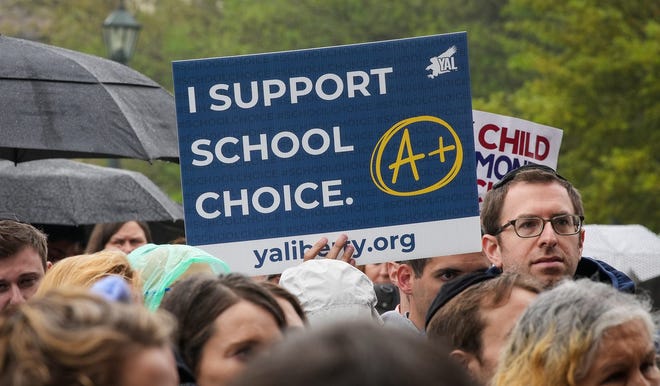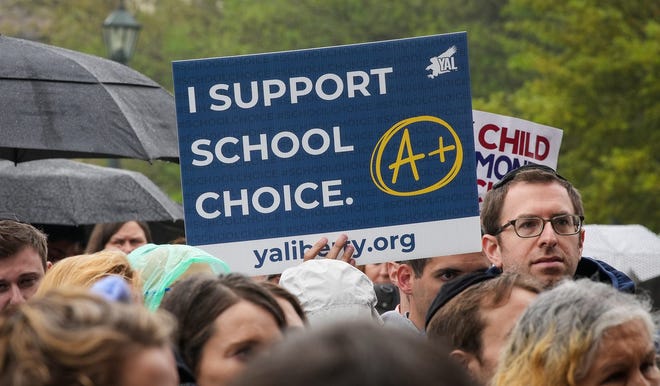Reflecting on the tenets that shape our educational practices is fundamental for …
Jay Z unveils efforts to support struggling public schools through school voucher program
Emma Wordsmith

Philadelphia parents were informed about school choice during a lunch event sponsored by an unexpected benefactor: Roc Nation, Jay Z’s entertainment company.
The high-profile celebrity is intensifying efforts to persuade Pennsylvania legislators to allocate millions of dollars for school vouchers before the state’s budget deadline on June 30. These vouchers would allow families to redirect public funds typically earmarked for public schools to private and parochial schools.
Earlier this month, Jay Z’s New York-based entertainment company revealed its endorsement of a $100 million private school choice initiative in Pennsylvania.
Desiree Perez, Roc Nation’s CEO, highlighted that the state’s current public school system isn’t effective for some underprivileged students, advocating for families to have wider access to alternative options, such as high-performing private schools.
Describing the situation as an “immediate need,” Perez emphasized the urgency of the matter.
Jay Z declined to provide a comment.
While Roc Nation’s efforts including meals, training sessions, advertising, and advocacy drew attention, it also faced criticism from public school advocates and national leaders who argue that school vouchers negatively impact students of color and those from low-income backgrounds. The concern is that diverting public funding to private schools could harm the already struggling public schools.
Recent court decisions have indicated a lack of adequate resources for all students in the state. In a ruling last year, the Commonwealth Court of Pennsylvania deemed the state’s funding model “fundamentally unfair to public school students” and mandated increased public school funding. Furthermore, the state House recently passed a measure to significantly boost state funding for public schools, as reported by the Associated Press.
With mounting pressure from the court, Pennsylvania’s imminent decisions regarding public education spending could mark a pivotal moment, according to Dan Urevick-Ackelsberg, a senior attorney at the Public Interest Law Center. He threatened legal action if the state fails to allocate fair funding in its budget deliberations.
In light of the legal victories against the education system, Urevick-Ackelsberg criticized Jay Z’s advocacy as ill-timed, asserting that efforts were underway to reform the state’s education system before the celebrity’s intervention.
Concerns were raised about the impact of vouchers on public schools, with advocates from Roc Nation explaining their support for public schools while endorsing school choice as a short-term solution for underperforming students.
What Jay Z communicated about school access
Roc Nation recently announced its support for several Pennsylvania bills advocating for funding that could be utilized for private schools. The company hosted informational sessions in Philadelphia to educate parents and voters about the Pennsylvania Award for Student Success program, encouraging them to express their backing for the initiative to legislators. If approved, the program would provide scholarships for families of students attending the state’s lowest-performing schools, enabling them to enroll in private schools and cover related expenses.
State Senator Patrick Stefano, a Republican from Western Pennsylvania, sponsored one of the measures seeking taxpayer funding. Democratic Governor Josh Shapiro also expressed support for the Stefano bill, as reported by Chalkbeat Philadelphia. Another bill introduced by Democratic Senator Tony Williams of Philadelphia proposes allocating $300 million for school choice scholarships instead of the $100 million Jay Z publicly endorsed.
Additionally, the private school choice program backed by Jay Z enjoys support from Republican billionaire and voucher advocate Jeffrey Yass.
Previously, Roc Nation contributed to private schools through the Shawn Carter scholarship program, offering eligible students financial assistance for tuition and related school expenses, according to Perez.
The opposition to vouchers
Major teachers’ unions, including the largest in Pennsylvania, argued that the focus should be on bolstering public school funding rather than diverting resources to private schools.
Following Jay Z’s announcement in favor of school vouchers, Randi Weingarten, head of The American Federation of Teachers, criticized the move, labeling vouchers as a tax cut for the wealthy that undermines state budgets and leads to the closure of schools and programs. Weingarten advocated for investing in public schools to ensure all students thrive.
Aaron Chapin, president of the Pennsylvania State Education Association, echoed similar sentiments, emphasizing the need to prioritize funding for public schools and address the state’s unconstitutional public school funding system.
Erika K. Wilson, a law professor and education researcher, emphasized the importance of public education in fostering citizenship and democracy, emphasizing that public schooling should be the primary avenue for achieving these goals. She raised concerns about racial bias and the negative impact of market mechanisms on Black communities.
Wilson suggested that partnering with public schools and creating community schools with comprehensive services would be a more effective approach to addressing education challenges, rather than promoting alternatives like private schools.

Developments in the school voucher debate
School choice initiatives in the United States have a long history, dating back to at least 1869.
Vermont introduced the town-tuition program in 1869, offering scholarships to students in towns without public schools, enabling them to attend public or private schools. Wisconsin’s Milwaukee Parental Choice Program, established in 1991, was the first modern school voucher program, providing low- and middle-income families with educational vouchers to access private schools they may not afford otherwise.
Recent years have witnessed a surge in support for state-funded voucher and scholarship programs, driven by parents discontent with pandemic-related school closures. Families have opted for alternative schooling options such as private schools, home schools, and charter schools, utilizing state funds in states offering voucher and scholarship programs.
The proliferation of school choice programs has led to new legislation in multiple states, indicating a continued interest in expanding educational options for students and families.
Implications for students and schools: School choice initiatives gain momentum post-COVID closures
As of now, 29 states and the District of Columbia have some form of school choice program, as per an Education Week analysis. This year, at least six states – Alabama, Louisiana, Georgia, Missouri, Nebraska, and Utah – have enacted new school choice programs or expanded existing ones, reflecting a national trend towards diversifying education options.
EdChoice is monitoring 83 bills in 30 states this year related to education savings accounts, vouchers, refundable tax credits, and tax-credit scholarships, indicating ongoing legislative activity in the realm of education policy.
Insights from research on voucher programs
Scholarship programs advocating for school choice, such as those supported by Roc Nation, have been met with skepticism by experts like Kevin Welner, an education policy professor at the University of Colorado Boulder.
Studies have shown that students utilizing voucher programs to transition from public to private schools often experience academic setbacks, particularly in mathematics. Several studies, including research on the Indiana Choice Scholarship Program, have demonstrated poorer academic performance among students in private schools compared to their counterparts in public schools.
Welner criticized the persistence of policies that have been proven detrimental to students, attributing their perpetuation to the influence of wealthy stakeholders like Jeffrey Yass. He suggested that ideological and financial interests, rather than educational success, underpin the push for school choice initiatives.
Similarly, education policy professor Joshua Cowan highlighted research findings indicating a decline in academic achievement for students enrolled in voucher programs in an article for The Brookings Institute.
Despite criticisms, Roc Nation remains committed to educating parents on available options, even amidst facing backlash as a perceived adversary.



